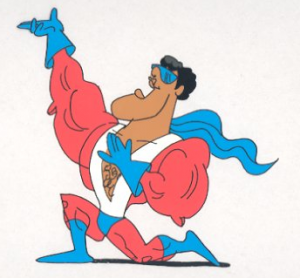We’re not sure when the verbiating of American legal writing began, but many trace it back to when Robert Bork got borked. Since then, verbiating has taken off, much to the chagrine of lawyers who prefer a more Garnered approach to writing. While we agree with some of the complaints about verbiated writing, we also believe that verbiating, when used properly and with attention to detail, can create powerfully persuasive briefs and legal documents.
 First, avoid confusing “verbiate” with “verbiage.” Verbiate is the act of creating a powerful verb out of an ordinary noun, as in “you should totally Facebook this post.” Verbiage, however, is a traditional method of drafting legal documents and counseling clients. So, as we like to emphasize here in the office, verbiate your verbiage. Don’t verbiage your verbs. Still confused? No worries, here are six examples of effective verbiating to improve your legal writing.
First, avoid confusing “verbiate” with “verbiage.” Verbiate is the act of creating a powerful verb out of an ordinary noun, as in “you should totally Facebook this post.” Verbiage, however, is a traditional method of drafting legal documents and counseling clients. So, as we like to emphasize here in the office, verbiate your verbiage. Don’t verbiage your verbs. Still confused? No worries, here are six examples of effective verbiating to improve your legal writing.
SEO
A social media and web-related entry, SEO technically and legally means “Says Everyone Online.” It’s used to confuse lay persons about online marketing effectiveness. Used as a verb in legal documents, however, it takes on a powerful connotation of futile complaining about a meritless contention. For example:
- Plaintiff can SEO all she wants but in the end her claim of unjust enrichment has no factual or legal support.
- Defendant’s continued reliance on equitable estoppel is a classic example of an overwrought and SEOed contention. In other words, full of sound and fury, signifying nothing.
2. Apple
Apple is a great example of what to do when you are noodling late at night over the best word to use to capture the essence of an argument. Instead of making a trip to the library to check out a thesauraus, look around the room and pick out five objects, whether live or undead. One of those five will work to verbiate your sentence and make it more powerful. That’s how we came up with Apple, which means an argument so beautifully designed that you 1) don’t care what it actually says or 2) are compelled to tweet about its awesomeness. For example:
- Appellant’s argument, while technically boneheaded and wrong, is so thoroughly appled that it is actually substantively correct. Please RT.
AARP
Most forty-something attorneys have already received a letter of good standing from AARP, or the American Association of Retired Persons. Good organization. But it’s a better verbiated noun. Use it to refer to an argument that’s seen better days. For example:
- Plaintiff’s mention of habeas corpus AARPs his argument, making it hard not to laugh. What’s next, mens rea? #asif
Early Adopt
A derivative of the phrase “hey, look at me,” early adopt has been used extensively in the tech and social media industry since early 2010. It’s poised to enter legal jargon this year but more as a defensive phrase instead of a phrase that typically denotes oblivious snarkicism. Use it effectively in criminal law matters. For example:
- My client did not steal Mr. Dayton’s wallet while brandishing a Glock 27. Rather, he early adopted the personal property of another, which is not a crime.
Shakalaka
It’s not clear what shakalaka actually means, but that’s part of its usefulness. The word is linked to a Bollywood film and also to the phrase “Boom Shakalaka,” made popular by Sylvester Stone of Sly and the Family Stone. In legal briefs, though, use it to mean ultimate confusion or disarray. For example:
- Respondent has shakalakad his argument in such a way that no one — not even the Court — can find any meaningful legal theory in it except something that apparently got stuck up respondent’s ass.
Pic-a-Twit
This isn’t a specific verbiated word but more of a broad verbiation strategy. Although most legal writing instructors consider proper names to be nouns, they don’t have to be. With the right pick, or what we call a “pic-a-twit,” you can verbiate proper names to make them connotationally powerful. For example:
- Petitioner thinks that he can O’Keefe the shit out of his claim by repeating it so often that it becomes true.
Got the hang of it? Good. Let us know well it works for you in your next writing project, but remember to use it sparingly. If used correctly, verbiating may prove to be the difference between getting snarfed or kremlinned. We’re not sure what that means but it sounded good, which is the point.

[…] For sheer silliness of word play, I thought this was pretty funny. He’s kidding about what SEO stands for. I hope. Verbiate Your Nouns for Legal Shock & Awe […]